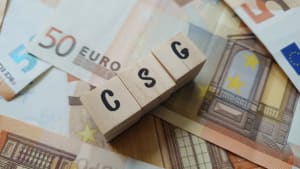The Economist
The economic recklessness of both France’s hard left and hard right
They favour soaking the rich, big spending and business-bashing
Jun 23rd 2024
Within two weeks France could have a hard-left or hard-right government. That prospect has led to alarm in financial markets and to claim and counter-claim about each bloc’s economic policies and the damage that might result. The French will vote in two rounds on June 30th and July 7th, after President Emmanuel Macron unexpectedly called a parliamentary election [lien réservé abonné], shocking even his closest allies and business. On Friday 21st he said he was “confident in French people, their intelligence, their strength”. But several new opinion polls [lien réservé abonné] published over the subsequent weekend show the hard right continues to be in the lead, with a left-wing coalition running second.
Both blocs’ agendas are “dangerous for the economy”, according to Patrick Martin, the head of medef, a business federation. The hard left’s tax and spending splurge could lead to a “catastrophe,” according to Oliver Blanchard of the Massachusetts Institute of Technology, while the hard-right’s programme “is like a Christmas tree, without logic or coherence”. Although neither bloc may gain a majority in parliament, France has high levels of public debt and a large deficit. As a result the public finances are more vulnerable than in the past to any divergence from centrist policies or political gridlock, while the national interest bill will swell if spiking risk-premia become permanently embedded in financial markets.
chart: the economist
On the hard right, Marine Le Pen’s total yearly net spending promises when she ran for president in 2022 amounted to a massive €102bn ($109bn), according to the Institut Montaigne, a liberal think-tank. This would be the equivalent of about 3.5% of gdp. Back then extravagant promises cost her little; she was never expected to win. Now that her party, National Rally (rn), is leading in the polls, the prospect of power and jitteriness of markets means it is trying to temper some of its pledges and postpone costly extravagances.
Jordan Bardella [lien réservé abonné], Ms Le Pen’s 28-year-old protégé and her candidate to become the next prime minister, now says that only some of the party’s promises would be put in place right away. The main immediate fiscal change would be to lower the rate of vat on energy and motor-fuel bills from 20% to 5.5%. The Institut Montaigne calculates this would cost up to €13.6bn a year. Mr Bardella wants to conduct an “audit” of public finances, presumably to secure a pretext for delaying costly pledges. The timetable for other party promises is vague.
The rn wants to cut payroll taxes in order to encourage firms to raise low-level salaries by 10%, which would carry a yearly cost of €10.5bn, according to economists at Allianz, an insurer. Mr Bardella promises to strike down Mr Macron’s pension reform, which raised the legal minimum retirement age from 62 years to 64; but now says that this would be “progressive”. He pledges that those who started work at 20 can retire at 60, which Allianz estimates cost €17bn a year, including a promised hike in the minimum pension.
Set against this, Mr Bardella resorts to the familiar claim that money could be saved by curbing fraud, improving efficiency and closing tax loopholes. Social-security bills, he says, would be reduced by tightening up on immigration. Setting France up for a full-frontal potential clash with the European Union, he also claims that he would negotiate a €2bn-3bn cut in the country’s contribution to the eu budget (€21.6bn this year) and pull France out of the eu’s electricity-sharing arrangement, which it says limits France’s ability to pass on the benefits of producing relatively cheap nuclear power to consumers. The rn also wants to restore the wealth tax, which used to apply yearly on all assets worth over €1.3m; Mr Macron replaced it with a form of “mansion tax” that applies only to property over that value.
Allianz estimates the rn’s total yearly spending pledges, excluding a plan to nationalise motorways, would amount to €74bn, with a net yearly cost of €18bn, excluding the reversal of the pension reform. Even factoring in extra tax revenues and savings, Allianz calculates that the rn’s plans would push the annual deficit up to 6.4% of gdp by 2026.
A swerve left
The left-wing alliance, dominated by Unsubmissive France, the party of Jean-Luc Mélenchon (pictured), a one-time Trotskyist, has even more ambitious tax-and-spending plans. Known as the New Popular Front (nfp), this movement wants to raise the minimum wage by 14%, which the Institut Montaigne estimates would cost €3.5bn a year. Its pledge to cap energy prices and those of other “essential items”, such as basic food, would cost a further €24bn a year, says the institute. Other measures include striking down Mr Macron’s pension reform, reintroducing the wealth tax, bringing in an “exit tax” for those leaving the country, scrapping France’s 30% flat tax on financial income, increasing inheritance tax and imposing a tax on “super profits”, whatever they mean by those. “For a lot of companies it’s going to be a shock,” said Eric Coquerel, from Mr Mélenchon’s party.
On June 21st the alliance, which is advised by a coterie of left-wing economists, among them Thomas Piketty, laid out its plans. It says the total new annual spending would come to €25bn in 2024, €100bn in 2025 and €150bn by 2027, and claims that this expenditure would be covered by extra revenues, notably from extra taxation, mostly on high-earners, financial assets and firms. Among the measures the nfp would introduce is a new wealth tax, which it says would raise €15bn, with a further €15bn from taxing “super profits”. It will also raise public-sector pay and housing benefit, and make all state-school meals and supplies free to all. The bill, it says, is nothing next to the “€100bn of money paid out to shareholders by the top 40 quoted companies in 2023”.
The left-wing alliance argues that it is putting forward a stimulus package that will help relaunch the French economy, and put an end to what it calls “a policy of austerity” under Mr Macron. Valérie Rabault, a Socialist member of the alliance, heroically projects gdp growth of at least 3% in 2025 and 2026—roughly double the forecasts of the Bank of France. Her forecasts for the budget deficit do not see a return to below 3% of gdp, as required by euro-zone rules, over the next five years. Mr Blanchard argues the result would be an exodus of entrepreneurs, and that the increase in the minimum wage would make employment costs unsustainable for many businesses and prompt redundancies.
Walk on the wild side
The optimistic view of all this is that French politicians often make wild economic promises but they are rarely enacted. Neither the hard left nor hard right may win an outright majority in parliament, which would mean political gridlock or coalition negotiations rather than unconstrained radicalism. Whoever makes up the next government will also be disciplined by the financial markets, this argument goes. Mr Bardella’s back-pedalling hints that the rn has realised this, and is beginning to manage voters’ expectations as well as to try to calm the markets. As it comes under scrutiny the left-wing alliance may need to do the same, although its fiery anti-capitalist rhetoric suggests it will find this hard.
A more pessimistic view is that France is vulnerable, more so than in the past. Its ratio of public debt to gdp has risen from 66% two decades ago to 112% now, and it is running a fiscal deficit of over 5% of gdp. In order to stabilise and reduce its debt load it needs pragmatic economic policies. New projections from Goldman Sachs, a bank, show debt to gdp rising slightly further under the status quo or a parliamentary deadlock. In the event of a hard-left or hard-right government it could jump to as high as 120% of gdp by 2027.
On June 21st yields on France’s ten-year bonds were 0.8 percentage points higher than for German ones, the biggest gap since 2012 and a rise of about 0.3 percentage points since Mr Macron called the election. If sustained these higher yields will eventually mean higher interest bills, adding to the fiscal strain. The political outcome of Mr Macron’s snap election remains highly uncertain, but economically it may come to be seen as marking the end of the centrist agenda of the past decade and the start of a more turbulent era.









